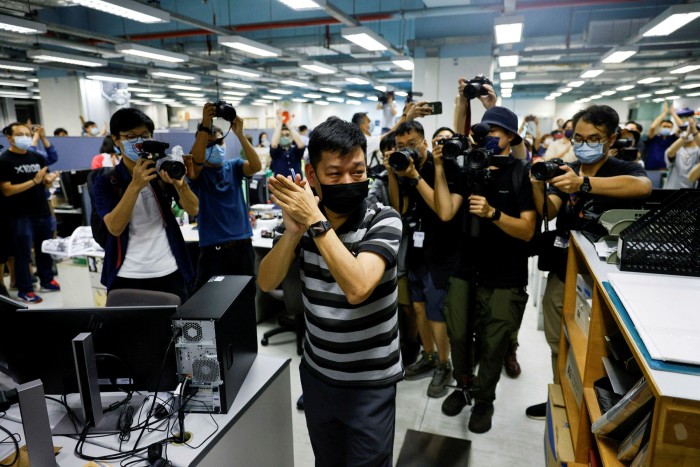[ad_1]
The Hong Kong government will gain powers to restrict local access to the world’s biggest technology platforms under legislation to punish “doxing†offences expected to be passed this year.
The measures are the latest government effort to assert greater control over civic freedoms in the territory following pro-democracy protests in 2019, when critics and supporters of the government alike engaged in doxing by publishing the personal information of police officers, lawmakers, journalists and protesters online.
But the anti-doxing bill, which will amend Hong Kong’s privacy laws, has been criticised for being too broad, leaving internet service providers and citizens vulnerable to arbitrary accusations and unfair prosecution. Critics said it could also be used to limit freedom of expression.
The amendment, introduced into the city’s pro-government legislature on Monday, came days after the Biden administration issued a stark warning about the risks to US businesses operating in the Chinese territory and a year after Beijing imposed a sweeping national security law.
Authorities have introduced other restrictions on information in recent months, such as limiting access to data on the companies registry and censoring films deemed to threaten national security.
Hong Kong’s pro-democracy Apple Daily newspaper, which was frequently critical of the government, recently closed under political pressure. Police on Wednesday arrested more senior editorial staff who worked for the tabloid, including former executive editor-in-chief Lam Man-chung.

Under the privacy law amendment, Hong Kong could order platforms such as Facebook, Google and Twitter to remove content classified as doxing and block local access to the platform if the company failed to comply.
Employees of the technology companies who are based in or enter the Chinese territory could also face jail time for failing to remove such material under the vast powers that will be granted to the city’s privacy commissioner.
“This makes me nervous,†said Paul Haswell, a technology partner at Pinsent Masons in Hong Kong. “The punishments are among the harshest in the world for doxing.â€
Employees who fail to take down material could face two years in jail and a HK$100,000 (US$12,865) fine. Individuals found guilty of doxing could face five years in prison and HK$1m fines.
Supporters of the legislation have argued that tough rules are needed to curb the misuse of personal information.
“Given the severe harm caused by doxing to victims like police and their families, there must be heavy penalties,†Holden Chow, a pro-Beijing lawmaker in the city, told the Financial Times.
However, the Asia Internet Coalition, a lobbying consortium representing US internet companies such as Facebook, Google and Twitter, warned last month that the legislation could force tech groups to stop providing services in Hong Kong because of the heightened risks for their staff. The AIC since added that none of their members planned to leave the city.
Erick Tsang, Hong Kong’s secretary for constitutional and mainland affairs, attempted to reassure tech companies on Monday. “If the employees of these companies in Hong Kong are only responsible for general marketing or administrative work, and they have no authority to act on ‘doxing’ content, they don’t have to worry too much about the legal liabilities,†he said.
The AIC said the planned laws were too vague, as they did not explicitly define doxing or the “psychological harm†caused by it that would be used as a test for prosecution.
The presence of large social media platforms and search engines in Hong Kong supports the city’s attractiveness to international businesses compared with mainland China, where access to information is restricted in a system termed the “Great Firewallâ€.
Media companies could also fall foul of the legislation. Haswell, the lawyer, warned that it was not clear if even publishing a photo of a person without their consent could count as doxing.
However, the bill’s supporters said normal news reporting was covered by existing exemptions.
The head of a US law firm in Hong Kong said international business groups had asked for new risk assessments in light of the anti-doxing legislation and the Biden administration’s notice.
“There is more urgency about communicating the potential impacts of this issue back to headquarters than I have seen before,†the lawyer said.
Additional reporting by Mercedes Ruehl in Singapore
[ad_2]
Source link






